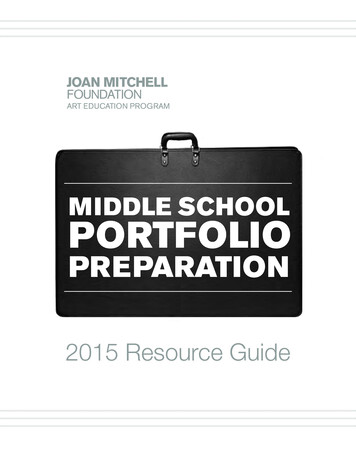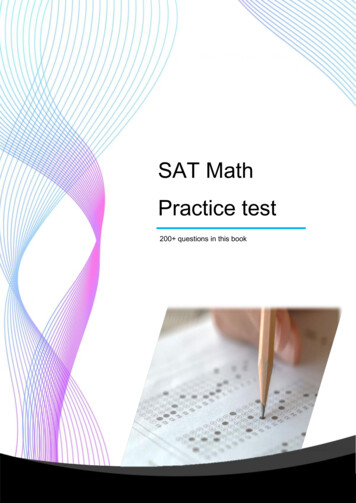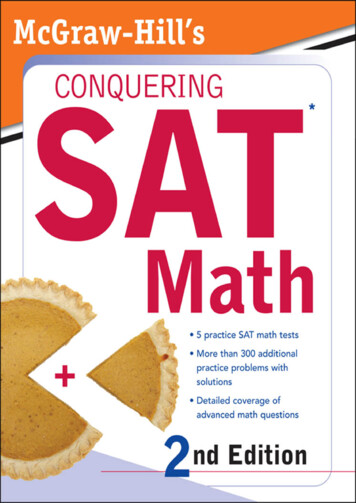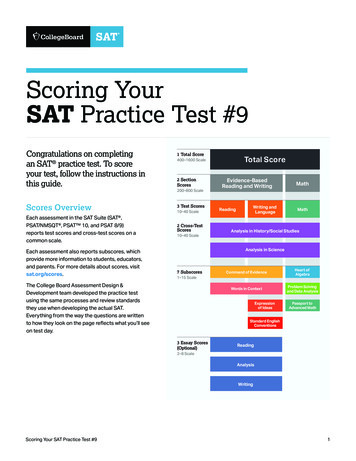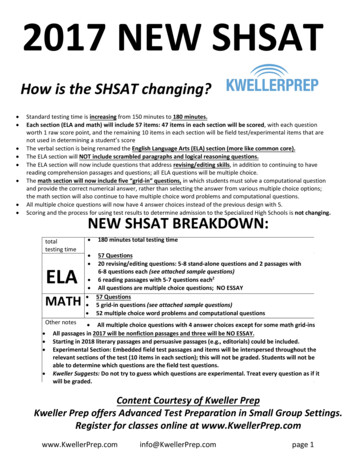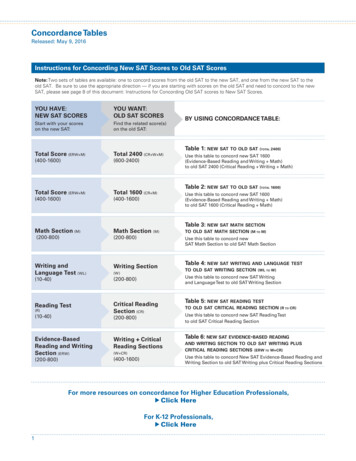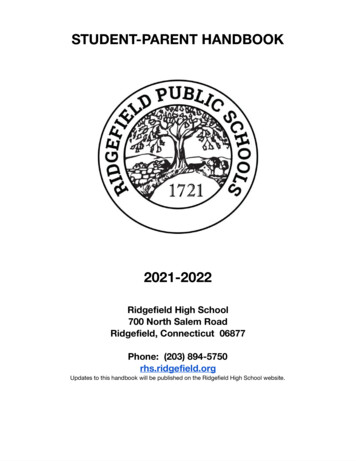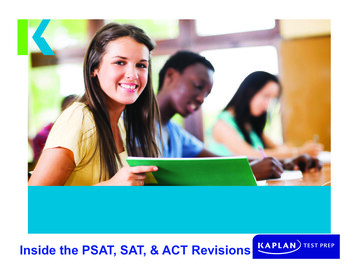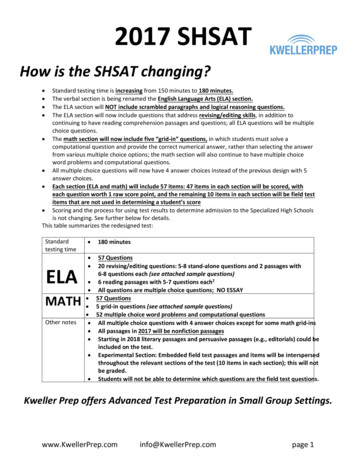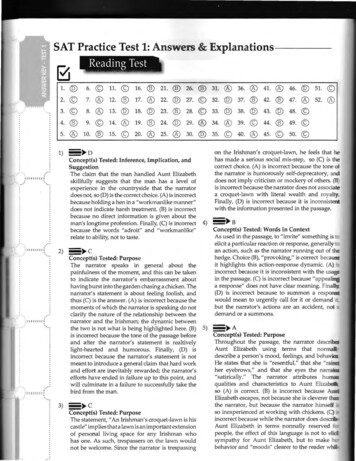
Transcription
SAT Practice Test 1: Answers & Explanations----Reading Test3. 8.4. 5. 1.2.',,,.1),.,.···.,. /· .··.16. 21. 12. 17.22. 13.18.23. 219. 24. 15.20. 25. 29.10. 7. 14.30. 2) ··.3)4) cept(s) Tested: PurposeThe statement, "An Irishman's croquet-lawn is hiscastle" implies that a lawn is an important extensionof personal living space for any Irishman whohas one. As such, trespassers on the lawn wouldnot be welcome. Since the narrator is trespassing33.34.35.36. 41. 46.37. 42. 47. 38. 43. 48.44. 49.45. 50.39 .40. 51.52. BAs used in the passage, to "invite" something iselicit a particular reaction or response, general! -an action, such as the narrator running out ofhedge. Choice (B), "provoking," is correct becaus. it highlights this action-response dynamic. (A) .incorrect because it is inconsistent with the usa';::in the passage. (C) is incorrect because "appe ·a response" does not have clear meaning. Finau:(D) is incorrect because to summon a respo ; would mean to urgently call for it or demanbut the narrator's actions are an accident, noc :demand or a summons.Ciiiii- C3. Concept(s) Tested: Words in ContextConcept(s) Tested: PurposeThe narrator speaks in general about thepainfulness of the moment, and this can be takento indicate the narrator's embarrassment abouthaving burst into the garden chasing a chicken. Thenarrator's statement is about feeling foolish, andthus (C) is the answer. (A) is incorrect because themoments of which the narrator is speaking do notclarify the nature of the relationship between thenarrator and the Irishman; the dynamic betweenthe two is not what is being highlighted here. (B)is incorrect because the tone of the passage beforeand after the narrator's statement is realtivelylight-hearted and humorous. Finally, (D) isincorrect because the narrator's statement is notmeant to introduce a general claim that hard workand effort are inevitably rewarded; the narrator'sefforts have ended in failure up to this point, andwill culminate in a failure to successfully take thebird from the man.31.on the Irishman's croquet-lawn, he feels that hhas made a serious social mis-step, so (C) iscorrect choice. (A) is incorrect because the tonethe narrator is humorously self-deprecatory,does not imply criticism or mockery of others.is incorrect because the narrator does not associa. a croquet-lawn with literal wealth and royalFinally, (D) is incorrect because it is inconsistwith the information presented in the passage.oThe claim that the man handled Aunt Elizabethskillfully suggests that the man has a level ofexperience in the countryside that the narratordoes not, so (D) is the correct choice. (A) is incorrectbecause holding a hen in a "workmanlike manner"does not indicate harsh treatment. (B) is incorrectbecause no direct information is given about theman's longtime profession. Finally, (C) is incorrectbecause the words "adroit" and "workmanlike"· relate to ability, not to taste.··ltUlllJII.: Concept(s) Tested: Inference, Implication, andSuggestionuuusui.:11.9. 6.5) AConcept(s) Tested: PurposeThroughout the passage, the narrator descr·-,.Aunt Elizabeth using terms that normdescribe a person's mood, feelings, and beha ·He states that she is "resentful," that she "raisher eyebrows," and that she eyes the narra:::" satirically." The narrator attributes h t1IL qualities and characteristics to Aunt Elizab so (A) is correct. (B) is incorrect becauseElizabeth escapes, not because she is clevererthe narrator, but because the narrator hims so inexperienced at working with chickens. (incorrect because while the narrator does des Aunt Elizabeth in terms normally reservedpeople, the effect of this language is not tosympathy for A unt Elizabeth, but to make behavior and "moods" clearer to the reader ""
adding humor to e passaoe. Finally, (D) is incorrectbecause the narra o· tions of Aunt Elizabethdo not set up a dear an direct contrast with thenarrator: descriptio are not of a clumsy narratorand a clever hen, but o a clumsy narrator and anangry hen.6)7)8) CConcept(s) Tested: CitationThe most conspicuous example of the seemingly"human" characteristics of Aunt Elizabeth is when she"raised her eyebrows" at the narrator and "sniffed"at him. The hen is responding in a typically humanfashion to the narrator, so (C) is correct. (A) is incorrectbecause the description of Aunt Elizabeth wanting topeck the man holding her does not indicate that shepossesses human emotions so much as that she wantsto get free of the man, which is natural for any animalbeing held against its will. The description in choice(B) serves to highlight the disheveled appearanceand general incompetence of the narrator, but it doesnot indicate that Aunt Elizabeth possesses humancharacteristics. Finally, (D) is incorrect because thelines focus on the narrator, not Aunt Elizabeth. 10)AConcept(s) Tested: PurposeThe narrator indicates that he is breathless whenhe claims, "I stood there, gasping." Thus, it makessense that he cannot speak well because of hisbreathlessness, making (A) correct. (B) is incorrectbecause the context of the narrator's assertion at lines56 - 59 does not suggest that he is worried aboutseeming pretentious, but rather that he feels foolish.(C) is incorrect because we cannot determine whetherthe narrator enjoys talking to strangers simply basedon his hesitance to utter a five-syllable word. Finally,(D) is incorrect because the inability to articulatea long word is a humorous detail, not a means ofskipping boring information. 9)11)cConcept(s) Tested: Words in ContextThe conte t in w hich the word "hitch" occurssuggests that the narrator had a problem taking holdof the hen, and that he "bungled" it. A "hitch" is aproblem or interruption to a process. Thus, (C) isthe correct answer. (A) is incorrect because a barrierprevents something from happening, and there isno indication that there was anything stopping thenarrator from taking hold of the hen. (B) is incorrectbecause an interlude is an intervening period of timebetween two events, and there is no indication thatthere was one. Finally, (D) is incorrect because" catch"means a built-in problem or trap. There was no catchto the attempted handover of Aunt Elizabeth to thenarrator; he simply bungled it by accident. BConcept(s) Tested: AnalogiesThe correct choice is (B) because the narrator is"hunting" Aunt Elizabeth by chasing her, and she is"outmaneuvering" him by running into hedges. (A)is incorrect because the narrator appears to dislike,not love, Aunt Elizabeth, imagining that she wants topeck him. (C) is incorrect because Aunt Elizabeth andthe narrator are not actually opponents. Rather, thenarrator is simply trying to capture her. Finally, (D) isincorrect because the narrator is not performing tricksfor an audience. cConcept(s) Tested: Inference, Implication, andSuggestionAunt Elizabeth's refusal to be caught hints ather stubbornness, or obstinacy, and the narratorcharacterizes her as possessing "baffled resentment."Thus, choice (C) is correct. (A) is incorrect becausethe narrator's descriptions of Aunt Elizabeth, such aswhen he says that "she slipped from my grasp like aneel," indicate that she is exceptionally uncooperative.(B) can be eliminated because the narrator indicatesthat Aunt Elizabeth is fairly shrewd, as she eyes thenarrator "satirically," an action that requires a degreeof intelligence. There is not evidence to support choice(D), as Aunt Elizabeth's attitude toward the Irishmanis not mentioned in the passage.AConcept(s) Tested: Attitude and ToneThe narrator says that he is "only too well aware" ofhis disheveled appearance, and that his legs "felt as ifthey had ceased to belong to" him. We can infer thathe is deeply embarrassed, so (A) is the correct choice.(B) is incorrect because there is no indication that thenarrator feels frightened by the other characters. (C)is incorrect because there is no indication that thenarrator "presumes" or expects special treatment orprivileges. He is, rather, apologetic fo r his blunder.(D) is incorrect because, although the narrator isembarrassed, he is not shy and reserved; h e is illingto engage with the other characte, up toexplain himself. 12) BConcept(s) Tested: Primary purposeChoice (B) is correct; throughout the passage,the author describes ways in which journalistscircumvent China's "increasingly unreasonable"censorship laws, which effectively summarizes thepassage's purpose, making (B) the best choice. Choice(A) is incorrect; while the author does characterizeindependent journalists in China as "flexible andcourageous," he does so infrequently, so praisingChinese journalists is n ot the primary purpose of thesAr 1:Answers & Explanations J 497
:-. ptpassage. Choice (C) is incorrect becau eonly describes general censorship la, s innot ones that "target independent jou.maJE:s.Choice (D) is incorrect because news pominor point in the passage, not the prim13)UUUIIII14)"·'.uuuu::.··· · .BTested: Summary) is correct because paragraph 3 revealsChina, one can only call him/herself a , if he or she holds a press card, whichbe i sued by a registered media outlet. Thus,nature of being "independent," independentjournalists cannot call themselves "journalists"becau e they do not hold press cards. For thisrea on, they identify by various other professionaltitles to circumvent the law. Choice (A), (C), and (D)are incorrect because they are not supported by anyof the passage information. DConcept(s) Tested: Words in ContextChoice (D) is correct because "to capture attention"is an English idiom that means to attract or drawinterest from the public, making "attract" the mostappropriate choice given the context. Choice (A) isincorrect because a news story cannot "express"attention, it draws, or attracts, it. Choice (B) isincorrect because "to apprehend" is to physicallycatch or stop a person, which does not make sensein the context of a sentence discussing a story'sability to attract interest. Choice (C) is incorrect; "torepresent" has many meanings, none of which fitthe context of the sentence or mean "to attract" or"to capture."17) AConcept(s) Tested: Inference, Implication, andSuggestionChoice (A) is correct because the writer suggeststhat most of his information on this topic comesfrom interviews and discussions with Chinesejournalists, not from firsthand experience. Thus,it is reasonable to conclude that he is researchingthis topic from outside of China. The other choicesare incorrect because they state that the author isin or from China, assertions for which there is noevidence.18) .··.'.··.c15)Concept(s) Tested: SummaryChoice (C) is correct because the passage discussesnumerous ways that Chinese independentjournalists have been" resourceful" in circumventingChinese regulations (see paragraphs 2, 4, 5, 6, and 8)by using "subterfuge," or deception (see paragraph4). Choice (A) is incorrect because, in lines 117 and118, the author characterizes Chinese independentjournalists as "flexible and courageous," whichdisproves choice (A). Choice (B) is incorrect becausedescribing the actions of Chinese independentjournalists as "insurrection" is too strong- althoughthese journalists are finding ways to circumventChinese law, they are not staging an all-out revoltor "rebellion" against the Chinese government.Choice (D) is incorrect because the author revealsthat Chinese independent journalists are findingsubtle ways of defying Chinese censorship laws, sothese journalists' actions are not characterized by"sympathy."19)s) AConcept(s) Tested: Words in ContextChoice (A) is correct; "follow the convention"describes how independent journalists approachreportage literature. Because reportage literatureis a profession or practice, we can infer thatjournalists "adhere to," or keep to, the "practices,"or ways of doing things, within this field. Choice(B) is incorrect because it is unconventional to claimthat a professional field has "habits," as habits areusually reserved for sentient being (humans andpossibly animals). Choices (C) and (D) are incorrebecause, in the context of the sentence, "follo 'does not mean "keep track" or "accompany." DConcept(s) Tested: Inference, Implication, andSuggestionChoice (D) is correct because lines 44 - 51 describa system in which Chinese independent "journalihave close connections with editors or managemestaff from more established media outlet ,which implies that registered media outleand independent journalists "communicate aicooperate" to create news. Choice (A) is incorrbecause lines 44 - 51 disprove the claim thattwo groups are "not collaborative." Choices (B) an(C) are incorrect because the passage providesevidence supporting either choice. BConcept(s) Tested: CitationChoice (B) is correct because it succincsummarizes the relationship between independ and registered journalists in China: independ journalists may work as "sub-contractors""more established media outlets," proving thattwo groups "communicate" and "cooperate" i· one another. All other choices are incorrect becal.l.:Fthey do not accurately characterize the relations ·between independent journalists and establish ·media outlets.
20) 21) 23)24)25) 26) DConcep · Tested: Attitude and ToneIn parah 1 the author states that the observationsof 1aur an ' Hervey should be taken with caution,because the are literally "half asleep." This suggeststhat the author is skeptical of their work. (D) is thecorrect choice. (A) is incorrect because the authordoes not plainly disagree with or criticize Mauryand d' Herv ey. He instead counsels caution whenconsidering their claims. (B) is incorrect because, ifthe author had a generally positive outlook towardMaury's and d'Hervey's work, he would not advisebeing cautious toward their claims. Finally, (C) isincorrect because the author does not display a deepfascination with Maury's and d'Hervey's work, andhe does not discuss it in great detail. A BConcept(s) Tested: CitationChoice (B) is correct because it states that dreamsinclude "the colored spots that the eye reallyperceives" even in sleep, which is the paragraph'smain contention. (A) is incorrect because lines 13-18describe a procedure, not a contention or conclusion.Neither (C) nor (D) are the correct choices becauselines 22 - 26 and 31 - 32 describe examples, not mainpoints.BConcept(s) Tested: Words in ContextIn line 7, the author u ses the word "people" as averb. (B) is closest in meaning, because to populatemeans to fill with people, which is an accurate wayto describe the images of people that appear inone's dreams. (A) overstates the meaning; p eopleappearing in our dreams does not necessarily meanthat they crowd, or overpopulate, them. (C) isincorrect because to individualize means to changesomething to fit someone's needs, whid1 does notllLLvu---Concept(s) Tested: SummaryThe author says that once people are trained to keeptheir eyes closed and retain dreams, "one sees thefigures and objects of the dream melt away little bylittle into phosphenes, identifying themselves withthe colored spots that the eye really perceives whenthe lids are closed." In other words, we constructour dreams based on colors that our eyes discernwhen closed, so (A) is correct. (B) is incorrect becausethe muted hues and shining spots associated withan ocean dream were meant to be an example, notapplicable to every dream. (C) is incorrect becausethe author mentions training only in order tounderstand dreams, not as a goal in itself. (D) isincorrect because it is overly general; the passagedoes not include discussion about why we visualizeparticular objects or materials in dreams beyondclaims that their colors are from external stimuli. DConcept(s) Tested: Inference, Implication, andSuggestionThroughout the passage, the author states thatdifferent phenomena can influence the productionof different dreams. The author mentions that aflickering lamp of a night nurse can produce dreamsof fire, and that the light of the moon can producefeelings of love. This suggests that dreams areproduced by identifiable causes, so (D) is correct. (A)is incorrect because the author does not indicate thatdreams are necessarily metaphorical and poetical.Though they may involve these elements, the mainthrust of the author's claims is that dreams areconnected to external reality. (B) is incorrect becausethe author does not state that dreams are determinedby culhire or history. Finally, (C) is incorrect becausethe author is concerned with those aspects of dreamsthat are common across individuals, not unique tothem. U) " '·ol es making somethingcivilized, and the author-ean1s need to become moreBConcept(s) Tested: CitationChoice (B) is correct because it describes recentChinese legislation that has made "reporting onsensitive stories . much more dangerous" forindependent journalists. All other choices areincorrect because they do not support the claim thatChinese independent journalists take "immenserisks" in their line of work.22)ce. 1'mauy,AConcept(s) Tested: SummaryChoice (A) is corrbecau e paragraph 7 revealsthat "independen wri ers "produce content forpublic platformsch a "Qianjieyihao," and thatthe content on these latforms is "frequently quotedby news portals," p roviding thorough support forchoice (A). Choice (B) is incorrect because the passagestates that "portal sites cai111ot conduct original newsreports," and does not indicate that portals "illegallyhire independent journalists." Choice (C) is incorrectbecause paragraph 7 does not indicate that WeChatis "state-sponsored." Choice (D) is incorrect becauseparagraph 7 states that portals cannot "have theirown reporter teams," disproving (D).27) cConcept(s) Tested: Words in ContextThe best choice is (C) because it fits most closely withthe metaphorical meaning of "dust" in line 33. The"visual dust" the author mentions refers to colorsSAT 1:Answers & ExplanationsI 499
that appear, like dust motes in the air orparticles in a mist. (A) is incorrect because ; tnot fit the context of the sentence. (B) and )incorrect because neither "dross" nor " ·describes floating particles.28). . .I,.···.IS 11 I I 1111:. . cConcept(s) Tested: SummaryIn paragraph 4 (lines 50 - 70), the author de crtwo dreams that are set in places where the dream remember seeing fire. Their memories are e o ein dreams by an external light source. Thus, (C) isthe answer. The answer cannot be (A) because theauthor contends that light contributes in an abstractway to dreams, but not directly; in other words, themen did not dream about the passing lamp. (B) isincorrect because the author is discussing specificexamples, not making general statements about firein dreams. (D) is incorrect because the author is notmaking recommendations. .·· . .···.:31)j::(:. ::', j::::::::i··33)i29) AConcept(s) Tested: CitationChoice (A) provides direct support to the answer tothe previous question, because in lines 42 - 44, theauthor writes that external light "is at the bottom ofmany of our dreams." (B), (C), and (D) all describespecific examples, so they are incorrect answerchoices . \)"''"" .30)D·,:Concept(s) Tested: Summary:Choice (D) is correct because it is the best summary:of the descriptions in paragraph 4. (A) is incorrectbecause the night nurses' lanterns, not the nightnurses themselves, affect the patients' dreams. (B) isincorrect because the passage does not say or evenimply that the patients in the hospital are militaryveterans reliving real experiences in their dream s.(C) is incorrect because the author does not say or' i SI I: 111 U jimply that the dreams are about actual experiencesor real-world events.D1Concept(s) Tested: Purpose e au thor suggests that moonlight causes men toof young women, and that the experiencecommon that it may be "the origin" of thele of a shepherd and a moon goddess. Thus,(D) · correct. (A) is incorrect because the author'sic · dreams, not myths. (B) is incorrect becausee author mentions the fable in order to presenta eo about the moon's influence on dreams,no o distinguish between levels of light. Finally,(C) · incorrect because, in mentioning the fableof End mion, the author does not establish aconnection between dreams and our deepestlongings.·. AConcept(s) Tested: PurposeThe author uses the adjective "curious" in thesense of "strange or odd." Thus, (A) is the answerbecause the purpose of pointing out something oddis often to convey a sense of interest or wonder. (B)is incorrect because there is no indication that theauthor is confused, merely that he is pointing outs01nething he regards to be an odd phenomenon.(C) is incorrect because there is no indicationthat the author feels disapproval. (D) is incorrectbecause the author is not using "curious" in thesense of "eager to learn," nor mentioning anythingabout the need for further thought.34) DConcept(s) Tested: Inference, Implication, andSuggestion; Multiple-Text SynthesisThe authors of Passage 1 and Passage 2 are largelyunconcerned with the morality of the actions theyadvocate as long as state stability is maintained.Morality plays little or no role in either author'sanalysis. This in turn suggests that each authoris offering practical advice about how to winand survive. Thus, (D) is the correct answer.(A) is incorrect because neither author appearsinterested in starting war for its own sake. (B) isincorrect because Passage l ' s author, Sun Tzu,supports rather than opposes war when necessaryto maintain the state; and the author of Passage 2,Machiavelli, advises the new prince to take anaction to secure power. (C) is incorrect because bothauthors present general strategies for winning, noplans for a specific battle. AConcept(s) Tested: PurposeThe answer is (A) because Sun Tzu' s shoimperative statements are not directed at any onparticular person, situation, place, or time. They carbe thought of as "axioms" - statements to be takeras true. Because they can apply to any competitivcircumstance, they are impersonal in tone. (B) Eincorrect because the statements do not seem wea,or unlikely due to a lack of explanation; justopposite, they seem to be more obviously trumore axiomatic. (C) is incorrect because the wriremains mysterious; the reader has no idea abo ·what his status or authority may be. (D) is notbest choice because while the axiomatic stateme sound like stark truths and stern commands,author emphasizes the importance of shrewdnes::not n ecessarily emotional toughness.
explaining one'term "feign." Sunto be disorganizedin order to trap an a ckin army. (A) is not asclose in meaning, al ough ei · g likely involvesexaggeration. (B) and (D) are incorrect becauseSun Tzu is advising neither the covering up of northe "forging" of actual · rder, but the opposite:pretending to be disordered o appear vulnerable.39)37)While" observe" can refer to seeing something happen,another meaning is to comply with something, as in"observe the rules." Because the context in which"observe" is used suggests the latter meaning, thecorrect choice is (C). (A) is incorrect because "tocommemorate" an event means remembering it witha marker or ritual, which would not makes sense inthe context. (B) and (D) are incorrect because neither"pronounce" nor "notice" would make sense in thecontext of the passage. AConcept(s) Tested: Attitude and Tone, MultipleText SynthesisThe correct choice is (A) . achiavelli is describinghis observation that powerful men often holdonto power by tricking others-circumventing or"going around" peoples' better judgment. Sun Tzuadvises holding onto power by playing tricks on theenemy. He even writes that" All warfare is based ondeception." Therefore, it is likely that he would beunsurprised and dispassionate about Machiavelli'sadvice. (B) is incorrect because Sun Tzu seems to haveno qualms about deception. (C) is incorrect becauseit is reasonable to suspect that Sun Tzu would becompletely satisfied with Machiavelli's contention,not with the hesitancy suggested by "faint praise."(D) is wrong because there is no indication that SunTzu would set limitations or conditions for trickingothers. 40)41)Choice (B) is correct because Sun Tzu's statement that"All warfare is based on deception," is consistentwith Machiavelli's assertion that great m en staypowerful by tricking others. (A) is incorrect becausewhile it says that the "art of war" is important tothe state, it does not specifically address the topicof deception. (C) and (D) are incorrect because theydescribe strategies in war, but do not specificallydiscuss deception.DConcept(s) Tested: Inference, Implication, andSuggestionIn the context of Sun Tzu's advice about ways togain the advantage of surprise over the enemy, thestatement about unfathomable plans-plans thatno one can predict-suggests that the plans remainunpredictable even to one's own troops. Thus, (D) isthe correct choice. (A) and (B) are incorrect becausethe juxtaposition of "keeping troops on the move"with "devising unfathomable plans" indicates thatthe topic is surprise, not the fitness of the troops.(C) is incorrect because "unfa thole means"mysterious" and implies secre , e o posi e ofAConcept(s) Tested: Summary AConcept(s) Tested: Multiple-Text SynthesisThe correct choice is (A) because Sun Tzu's advice to"dissimulate," or pretend to feel or think differentlythan one actually does is similar to Machiavelli'sinstructive description in lines 59 - 68 of AlexanderVI. Machiavelli says that Alexander "did nothingelse but deceive men, nor ever thought of doingotherwise," and that there was never anyonewho "with greater oaths would affirm a thing, yetwould observe it less . " (B), (C), and (D) are allincorrect because they do not reflect the meaning of"dissimulate," and also because the concepts theyrepresent are not mentioned in the passage.B Choice (A) is correct; Machiavelli notes that, in hisexperience, princes can fool people easily because"men are so simple, and so subject to presentnecessities." A paraphrase of the sentence is thatpeople are ruled by what they need at the moment,or by solving immediate problems. (B) and (C)are incorrect because there is no indication in thepassage that Machiavelli is saying that people cannotlook outside of themselves or that they cannot see the"big picture." (D) is incorrect because Machiavelliclarifies that by "simple" he means short-sighted, notnecessarily stupid or unsophisticated.Concept(s) Tested: Citation38)cConcept(s) Tested: Words in Context .-,Ph:lcnrl36) trategies to the troops.42) BConcept(s) Tested: CitationChoice (B) is correct because in lines 63 - 67,Machiavelli i u ing Alexander VI as an example ofsom eone ho succeeded through dissimulationpretending to think and fee l differently than he did.(A) is incorrect ecau e the statement in lines 43 - 46is not specificallou t Alexander. (C) and (D) areboth incorrect because they do not directly addressdissimulation and because they are not focused onAlexander.SAT 1:Answers & Explanations jso1
43).,.' (44)'·.' :, .···lUIIIIUt,;.' .: ,,.,,,'·.,' ' ,,.(45)' ' ;1·. . · iuans:,,i.,,,,\':'.,,,.,.,.,.,,.,,,,,,' ,,,,.,.' ' ,,:,,.'.-··.UIUUUt"' .';'··:46):):(:' ' ,,' ,,.,j:?·. :::::::::::' .·· Dmrnept(s) Tested: Words in Contextline 2, the "surface expression" of the buried· being compared to the rim of a blanketm" "Plc,P i bowl. One cannot see the bowl, just the, , or "form," of its rim where it pushes uplanket. Thus, (A) is correct. Choice (B) doese sense in the context of the sentence sinceare unrelated to the topic of the passage. (C)in orrect because an iteration is a repetition of amo ·on or an action, which could not be appliedibl to a blanket-covered bowl. (D) is incorrectbeca e the blanket-covered bowl in question couldnot be called a narrative.Concept(s) Tested: Inference, Implication, ansuggestion; Multiple-Text SynthesisBoth authors are concerned with maintabinstable governments, and both authors discusdeception and trickery they feel is required to oTherefore, the correct choice is (D). (A) is incorrbecause neither author seems to think that peo leare fundamentally good; Machiavelli even stathat they are bad. (B) is incorrect because neitherauthor mentions future generations; they both seemconcerned with their own. Finally, (C) is incorrectbecause in these excerpts, neither author addressesways to inspire loyalty . B48) - cConcept(s) Tested: Inference, Implication, andSuggestionGenerally, a "smoking gun" is a metaphor thatrefers to compelling evidence, as in a murdersuspect holding a gun that is still smoking frombeing fired. Thus, (C) is the correct choice. (A) isincorrect because there is no indication in thepassage that the crater is still steaming or" smoking"65 million years after the impact. (B) is incorrectbecause the passage does not identify the theory as"controversial." (D) is incorrect because it mentionsthe smoke but not the gun. DConcept(s) Tested: OrganizationChoice (D) is correct because paragraph 2 providesthe crater's name, location, condition (buriedunder a kilometer of rocks), and importance as thesuspected site of the asteroid event proposed by theAlvarez team. Thus, it introduces Chicxulub and itsscientific significance. (A) is incorrect because it is apartial answer; paragraph 2 does explain how thecrater disappeared (by being buried), but it alsoincludes other important information as well. (B) isincorrect because the paragraph does not providedescriptions of earlier discoveries. (C) is incorrectbecause it is too broad to describe paragraph 2 . cConcept(s) Tested: PurposeChoice (C) is correct because, before the crater iscompared to a blanket-covered bowl, the authorsays, "the impact crater has left subtle clues of itsexistence on the surface." Thus, the blanket-coveredbowl is an example of the "subtle clues" that helpedscie
adding humor to e passaoe.Finally, (D) is incorrect because the narra o · tions of Aunt Elizabeth do not set up a dear an direct contrast with the narrator: descriptio are not of a clumsy narrator and a clever hen, but o a clumsy narrator and an angry hen.

